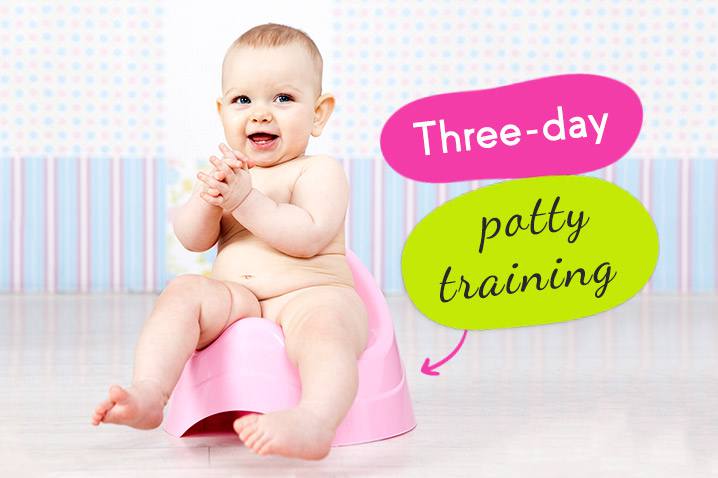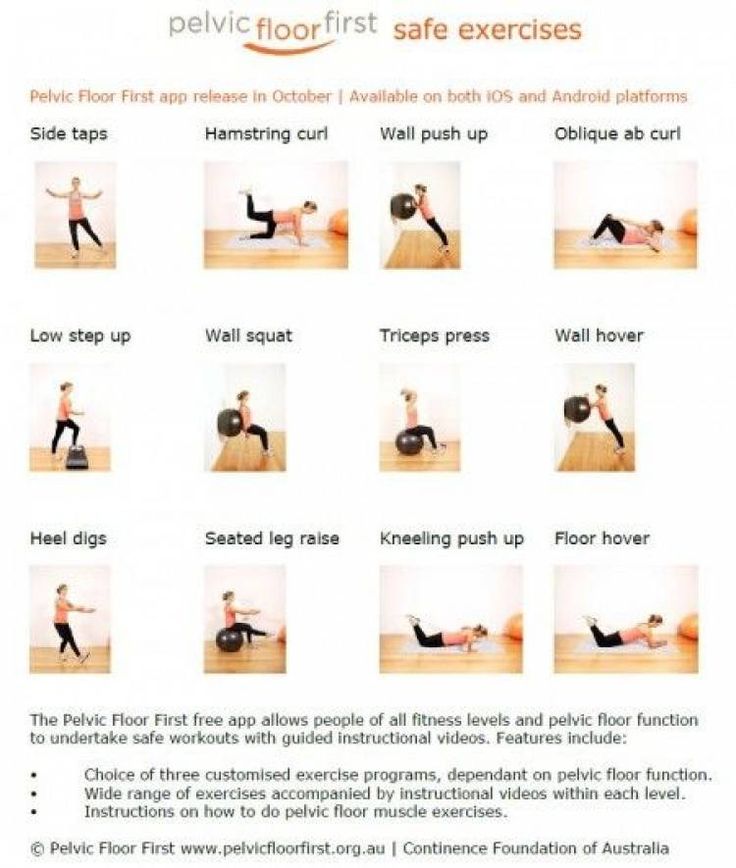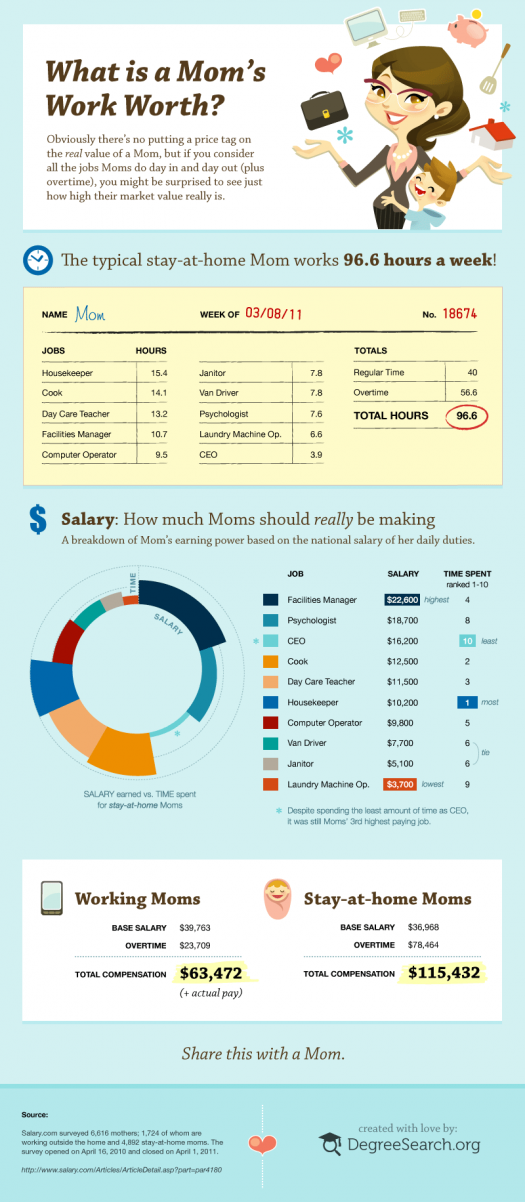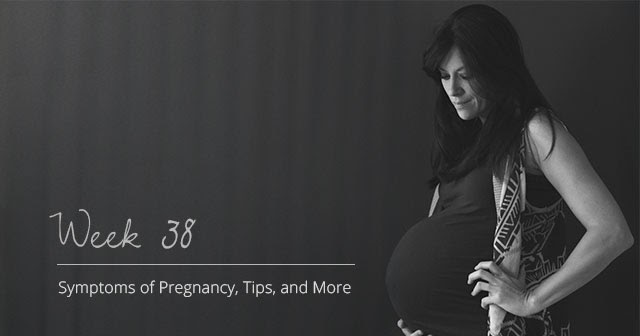Your baby week 13
13 Weeks Pregnant | Pregnancy
You are now a 3rd of the way through your pregnancy and you're hopefully through the worst of your symptoms.
What's happening in my body?
A small baby bump may now be visible as your uterus (womb) grows upwards and outwards. If you've been feeling the urge to pee more often, that should stop as the womb moves away from your bladder.
Meanwhile, there's a lot more blood pumping around your pelvic area and some women find that it increases their sex drive. It could also make you feel more thirsty, so drink lots of fluids.
Sex during pregnancy is perfectly safe, unless your midwife or doctor has advised you otherwise.
Infection alert
There are ways you can protect yourself and the baby from many harmful viruses and bacteria:
- Try to avoid contact with anyone who has chickenpox or rubella – talk to your doctor or midwife straight away if you think you could be infected.
- If you have a cat, get someone else to empty the cat litter tray, as the faeces could contain a bug called toxoplasma gondii.
This can cause an infection called toxoplasmosis that could damage your unborn baby.
- You can also get toxoplasmosis from certain foods. Foods to avoid during pregnancy include undercooked meats, cured meats like salami, and unpasteurised goats' milk and cheese.
- Seek advice before travelling to any area affected by the Zika virus, as the virus can cause birth defects.
Read more about infections in pregnancy on the NHS website.
Coronavirus (COVID-19)
You and your family should follow the government and NHS guidance on coronavirus (COVID-19):
- read government guidance on how to stay safe from COVID-19
- get NHS advice about COVID-19
- use the NHS COVID-19 app for England and Wales - it's the fastest way of knowing when you've been exposed to COVID-19
Teeth troubles
Swollen, painful and bleeding gums are common during pregnancy. Read about keeping teeth and gums healthy in pregnancy on the NHS website.
You are entitled to free NHS dental care during pregnancy and for a year after your baby is born. Ask your doctor or midwife for a maternity exemption certificate.
You already know the basics – clean your teeth twice a day, avoid sugary snacks and drinks, and don't smoke as it can make gum disease worse. But did you also know that:
- a soft toothbrush is best for sensitive gums
- you should brush in gentle circles, up and down
- if you're sick, protect your teeth by rinsing your mouth out with water, to flush away harmful acid in your vomit
- you should stick to alcohol-free mouthwashes to reduce plaque
2nd trimester pregnancy symptoms (at 13 weeks)
Your signs of pregnancy could include:
- swollen and bleeding gums
- pains on the side of your belly caused by your expanding womb (known as "round ligament pains")
- headaches
- nosebleeds
- bloating (read ways to cope with bloating on week 10's page)
- constipation (read about how to treat constipation on week 16's page)
- indigestion and heartburn (read ways to cope with indigestion and heartburn on week 25's page)
- sore breasts
- leg cramps
- feeling hot
- dizziness
- swollen hands and feet
- urine infections
- vaginal infection (read about how to treat vaginal infections on week 15's page)
- darkened skin on your face or brown patches – this is known as chloasma or the "mask of pregnancy"
- greasier, spotty skin
- thicker and shinier hair
You may also still experience symptoms from earlier weeks, including:
- morning sickness
- unusual pregnancy cravings
- heightened sense of smell
- mood swings
- white milky pregnancy discharge from your vagina
- light spotting (seek medical advice for any bleeding)
Read Tommy's guide to common pregnancy symptoms.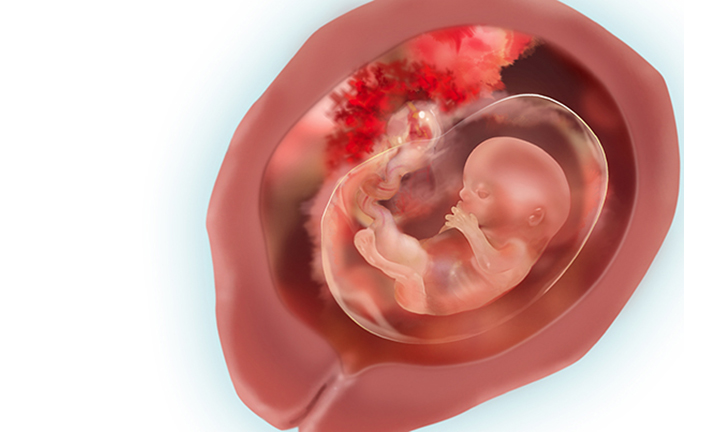
What does my baby look like?
Your baby, or foetus, is around 7.4cm long, which is about the size of a peach. The weight is about 25g, which is as heavy as a toothbrush with toothpaste on it.
Your baby's ovaries or testes are fully developed inside and final tweaks are being made on the outside. The baby is moving around. At first the movements are very jerky and random but then they start to look more deliberate.
You may not feel any movement until around week 17. Some babies suck their thumb in the womb. This actually serves a purpose as it helps to develop their sucking reflex. They'll need this when it comes to feeding.
Action stations
Many women will tell their employer after they've had their first pregnancy scan at around 12 weeks. Once you tell your employer, you have maternity rights and can attend antenatal appointments during paid work time. You can also ask for a risk assessment of your workplace to ensure that you're working in a safe environment.
It's a good time to tone up your pelvic floor muscles. Gentle exercises can help to prevent leakage when you laugh, sneeze or cough. Get the muscles going by pretending that you're having a pee and then stopping midflow. Visit Tommy's for more information on pelvic floor exercises.
Ask your midwife or doctor about online antenatal classes – they may be able to recommend one. The charity Tommy's has lots of useful information on antenatal classes and preparing you for birth.
Even if you've had children before, antenatal classes are still worth going to as you can meet other parents-to-be. The NCT offers online antenatal classes with small groups of people that live locally to you.
To keep bones and muscles healthy, we need vitamin D. From late March/early April to the end of September, most people make enough vitamin D from sunlight on their skin. However, between October and early March, you should consider taking a daily vitamin D supplement because we cannot make enough from sunlight.
Some people should take a vitamin D supplement all year round, find out if this applies to you on the NHS website. You just need 10 micrograms (it's the same for grown-ups and kids). Check if you're entitled to free vitamins.
It's recommended that you do 150 minutes of exercise a week while pregnant. You could start off with just 10 minutes of daily exercise - perhaps take a brisk walk outside. Check out Sport England's #StayInWorkOut online exercises (scroll to the pregnancy section). Listen to your body and do what feels right for you.
There's no need to eat for 2. You don't need any extra calories until the 3rd trimester, which starts in week 28. Try to eat healthily, with plenty of fresh fruit and veg, and avoid processed, fatty and salty foods. You may be able to get free milk, fruit and veg through the Healthy Start scheme.
You and your family should follow the government and NHS guidance on coronavirus (COVID-19):
To find out about about COVID-19 and pregnancy, childbirth and breastfeeding, have a look at advice on the:
You and Baby at 13 Weeks Pregnant
Pregnancy Week by Week
- Week10
- Week11
- Week12
- Week13
- Week14
- Week15
- Week16
Advertisement
Key Takeaways at 13 Weeks Pregnant
- Good news: You should hopefully start feeling more like yourself soon, as you enter your second trimester.
 The initial pregnancy exhaustion may fade and the nausea might too! The honeymoon phase of pregnancy is approaching, meaning you might get a burst of energy for a few weeks.
The initial pregnancy exhaustion may fade and the nausea might too! The honeymoon phase of pregnancy is approaching, meaning you might get a burst of energy for a few weeks. - You might have a 13-week ultrasound or possible non-invasive prenatal testing (NIPT), which looks for chromosomal abnormalities. Baby’s sex might be detectable at this point too—but not guarantees.
The end of week 13 is the end of the first trimester! We’re not just talking about getting through those work meetings without falling asleep (or puking), we’re talking about how you’re now 1/3rd of the way through your pregnancy! At 13 weeks pregnant, you’ve grown a fetus that has vocal cords, teeth and even fingerprints (wow!), and you’ve probably kept this incredible news (mostly) secret while wishing you could shout it from the rooftops—or, at the very least, use it as an excuse for getting to work late.
Watch Week 13 Highlights
Baby at Week 13
That little cutie of yours is growing fast as you approach the second trimester.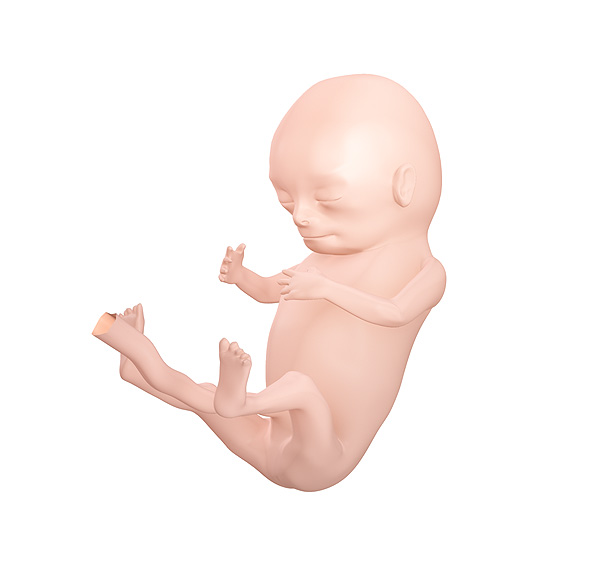 Here’s what you can expect.
Here’s what you can expect.
How big is baby at 13 weeks?
At 13 weeks, baby is as big as a lemon. Your 13-week fetus is about 2.9 inches long and weighs about .81 ounces, and proportion-wise, their head is now about 1/3 the size of the body instead of 1/2.
13 weeks pregnant is how many months?
At 13 weeks pregnant, you're three months pregnant, although doctors track pregnancy by week, not month. This is the last week of the first trimester. (We can’t say it enough because it’s so great to be here!)
13 week ultrasound
A 13-week ultrasound could detect baby’s sex, but since it can be pretty tough to make out little boy or girl parts, your doctor will probably wait until the mid-pregnancy ultrasound (around 18 to 22 weeks), when it will be much more obvious, to look and see whether you’re having a girl or a boy.
If you’ve chosen to have prenatal cell-free DNA testing, also known as non-invasive prenatal testing (NIPT), to screen for chromosomal abnormalities, you’ll be able to find out the sex when you get your results.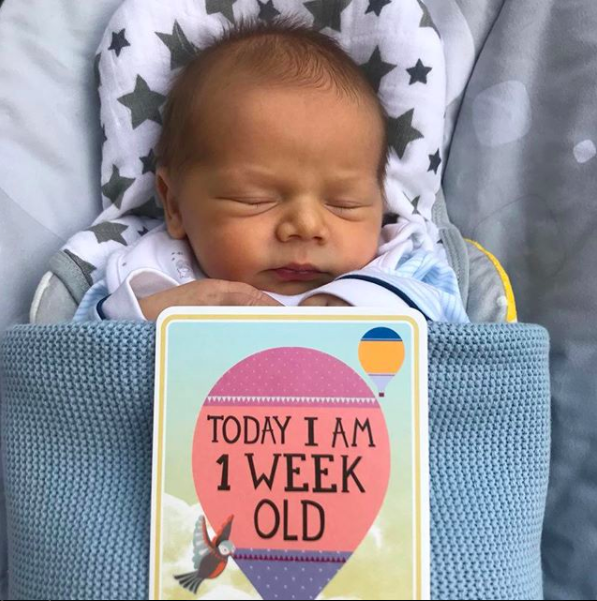 Hey, at 13 weeks, you may already know! Oh boy! (Or girl!)
Hey, at 13 weeks, you may already know! Oh boy! (Or girl!)
3D Views: My Baby, My Body
See their progress for yourself with our 3D interactive tool.
See My Baby in 3D
See My Body in 3D
Pregnancy Symptoms at Week 13
You might notice that around 13 weeks pregnant, your symptoms change a bit. You might actually be able to get through the day without nausea (if not now, soon) or feeling the need to nap. But you may be experiencing a few of these 13 weeks pregnant symptoms too:
Visible veins
You can see all those blue streaks and spider veins under your skin because you have increased blood flow.
Increase in energy
The second trimester is known as the least symptomatic and the most energetic. As you start to feel more like yourself and get that energy surge, you’re going to want to knock a bunch of to-dos off your list. Also, if you’ve found yourself too sick and tired to exercise lately, now’s the time to get back to a fitness routine.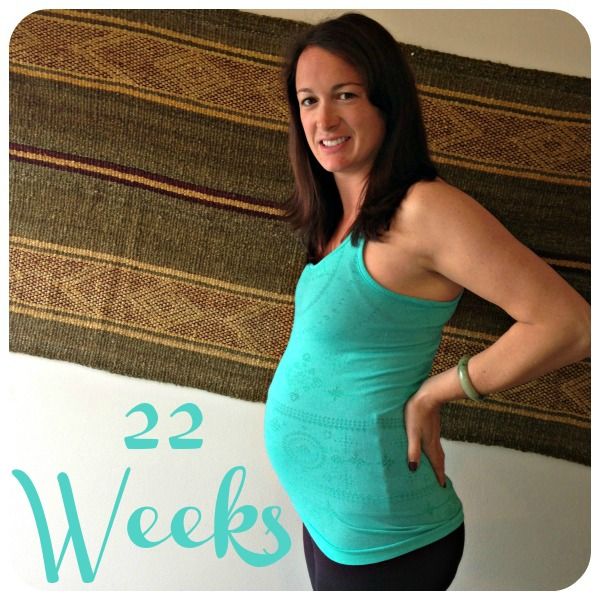 Exercise will only benefit you and baby and can even make labor easier. Worth it!
Exercise will only benefit you and baby and can even make labor easier. Worth it!
Increased sex drive
If you’re one of those lucky pregnant women who feels up for a roll in the hay at 13 weeks, enjoy! You may notice a bit of post-coital spotting during pregnancy at 13 weeks. A little spotting is normal simply because your cervix is more sensitive. But heavy bleeding (like a period) isn’t, so call your doctor if it’s more like a flow. Otherwise, you and your partner can use your increased sex drive to enjoy some together time before baby arrives!
Sorry, twin moms-to-be. If you’re 13 weeks pregnant with twins, you might still be experiencing some morning sickness and fatigue. That’s because twin moms can have more of the pregnancy hormone hCG in their systems. If your nausea and vomiting is super severe, definitely bring it up to your OB. If you’re able to hold down food and liquids but you’re still feeling ill, just wait it out a little longer.
What should I expect at 13 weeks pregnant?
At 13 weeks pregnant, you’re turning the corner and may even feel like a new woman after a first trimester of morning sickness, fatigue and other issues. You may experience 13 weeks pregnant symptoms, as well as some indigestion, achiness and tiredness that’s typical in the first trimester. Expect to feel a lot more at ease in the second trimester!
You may experience 13 weeks pregnant symptoms, as well as some indigestion, achiness and tiredness that’s typical in the first trimester. Expect to feel a lot more at ease in the second trimester!
Your Pregnant Belly at 13 Weeks
Your uterus is now big enough that it’s growing up and out of your pelvis. That means you’re starting to actually look pregnant. Finally, right? Expect to look more and more pregnant from here on out, because carrying a 13-week fetus calls for a weight gain increase. OBs recommend you gain weight in the healthiest way possible—that means slowly and steadily throughout your pregnancy. Here are the weight gain guidelines outlined by the American College of Obstetricians and Gynecologists (ACOG):
If you’re underweight (BMI under 18.5):
- Your recommended total pregnancy weight gain is 28 to 40 pounds.
- In the second and third trimesters, aim to gain about a pound (1 to 1.3 pounds to be exact) per week.
If you’re normal weight (BMI of 18.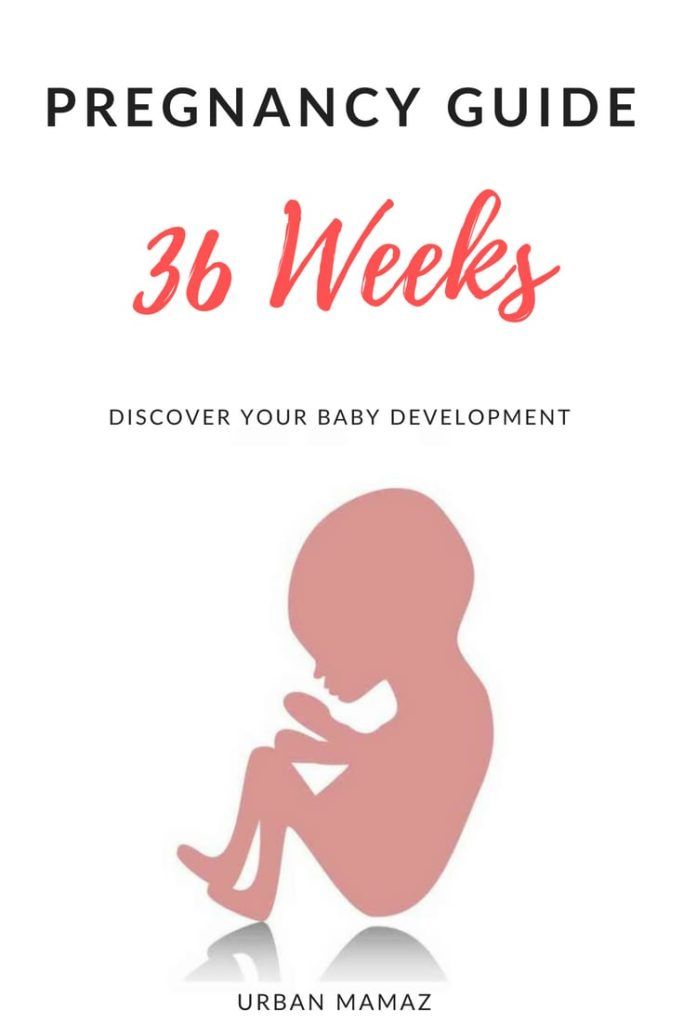 5 to 24.9):
5 to 24.9):
- Your recommended total pregnancy weight gain is 25 to 35 pounds.
- In the second and third trimesters, aim to gain about a pound or a little less (0.8 to 1 pound to be exact) per week.
If you’re overweight (BMI of 25 to 29.9):
- Your recommended total pregnancy weight gain is 15 to 25 pounds.
- In the second and third trimesters, aim to gain a little over a half pound (0.5 to 0.7 pounds to be exact) per week.
If you’re obese (BMI of 30 and above):
- Your recommended total pregnancy weight gain is 11 to 20 pounds.
- In the second and third trimesters, aim to gain about a half pound (0.4 to 0.6 pounds to be exact) per week.
If you’re 13 weeks pregnant with twins:
- Your recommended total pregnancy weight gain is 37 to 54 pounds.
- In the first half of your pregnancy, aim to gain about a pound per week. In the second half, aim to gain a little over a pound per week.
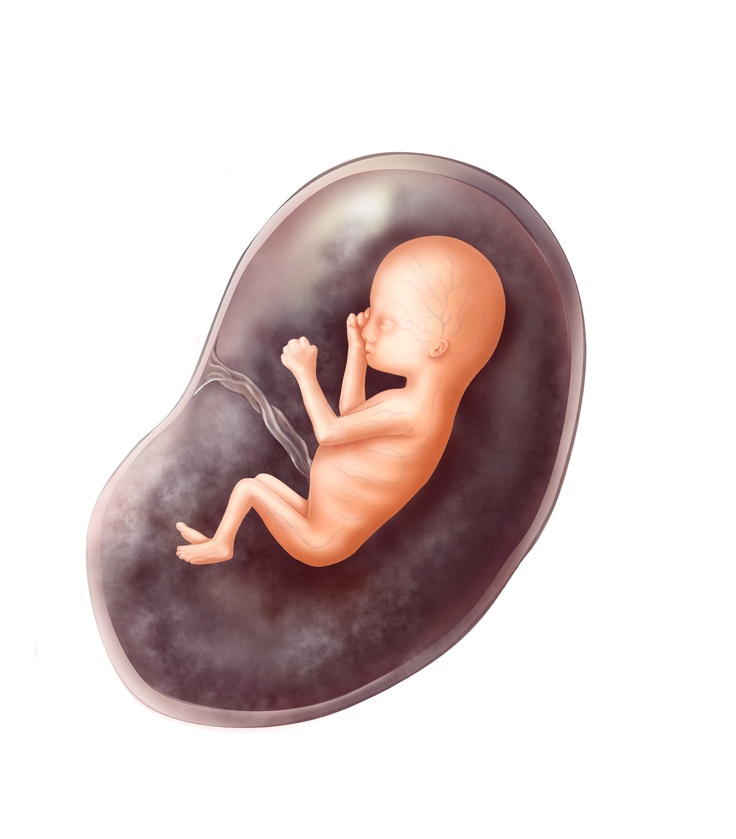
Of course, you don’t want to stress yourself out about these numbers. What’s important is that you’re eating a healthy diet full of a variety of different foods, eating about 300 extra (nutritious) calories per day more than you did pre-pregnancy and getting plenty of exercise.
How does your belly feel at 13 weeks pregnant?
You’re probably feeling great in terms of nausea and morning sickness! However, to make room for your fast-growing 13-week fetus, your uterus is moving upward and outward. This expansion can cause stretch marks and itchy belly skin. Don’t forget to moisturize and eat well to keep skin soft and supple!
Can you feel the baby at 13 weeks?
Possibly! It’s different for everyone, but some women (particularly those who have been pregnant before) may start to feel those telltale movements when baby’s at 13 weeks. If you haven’t felt the first flutters yet, don’t worry—it can take up to 25 weeks along to feel what’s called “the quickening.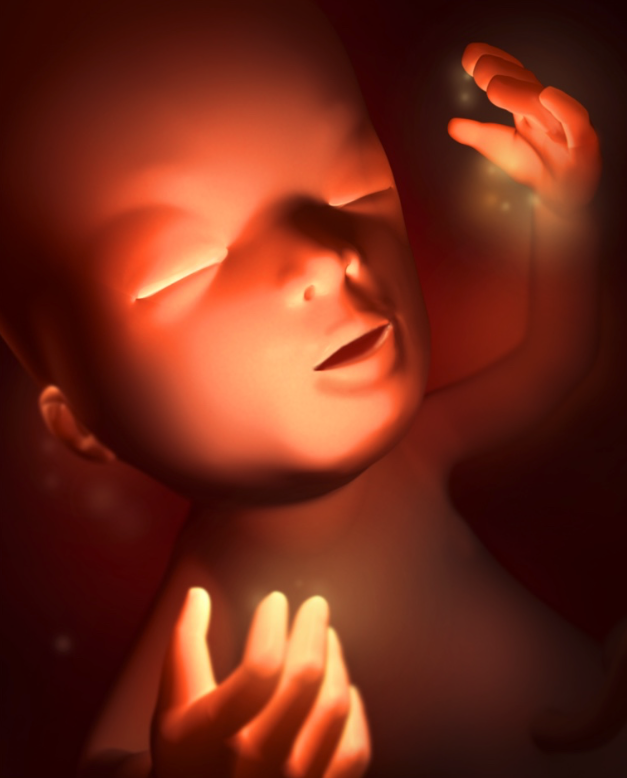 ”
”
“It's debatable how much calorie needs actually increase during pregnancy, because the data shows that it varies widely between women (though usually in the ballpark of 300 to 500 calories extra). One researcher suggests that the adage of ‘eating for two’ be replaced with ‘eating for 1.1’ to better reflect the moderate increase in calories per day. Focus on nutrient-dense foods, so every bite is as packed with nutrition as possible.” - Lily NIchols, RDN, CDE, a registered dietitian and nutritionist and certified diabetes educator.
Tips for 13 Weeks Pregnant Symptoms
Know the signs of a UTI
Left untreated, a urinary tract infection can potentially travel to the kidneys and pose a health risk for Mom and baby. If you need to use the bathroom more often than usual, feel burning during urination or it looks or smells unusual, visit your doctor, who can test for bacteria and prescribe antibiotics.
Strengthen your pelvic floor
When you’re carrying a baby at 13 weeks, your body needs all the support it can get.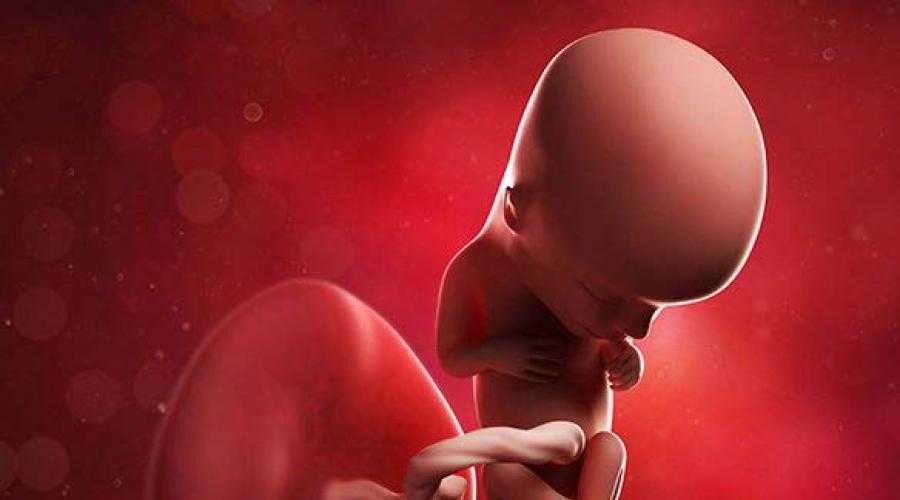 Your pelvic floor can weaken from pregnancy and labor, but you can do Kegel exercises to strengthen the area. They don't take a lot of time or effort, and a regular routine during pregnancy can pay off with less urinary leakage after you give birth and enhanced sexual sensations. Sounds good!
Your pelvic floor can weaken from pregnancy and labor, but you can do Kegel exercises to strengthen the area. They don't take a lot of time or effort, and a regular routine during pregnancy can pay off with less urinary leakage after you give birth and enhanced sexual sensations. Sounds good!
Find some together time
You and your partner may be hot and heavy between the sheets right now, but have some fun outside the bedroom too, so you can spend quality time with each other before baby makes three.
Eat a good breakfast
No more morning sickness? Breakfast is served! It’s the perfect time to get calcium, protein and the powerful nutrients that come from produce and whole grains. A healthy morning meal can also help you set the tone for nutritious eating for the rest of the day.
ADVERTISEMENT
Pregnancy Checklist at 13 Weeks Pregnant
Reminders for the week:
save article
PREVIOUS
Week 12Pregnancy
NEXT
Week 14Pregnancy
ADVERTISEMENT
Watch These Videos Next:
13th week of pregnancy - what happens, sensations in the abdomen at the thirteenth week of pregnancy, fetal development
WHAT IS HAPPENING
At the 13th week of pregnancy, your baby is about 6-7 cm tall and weighs 20-25 g.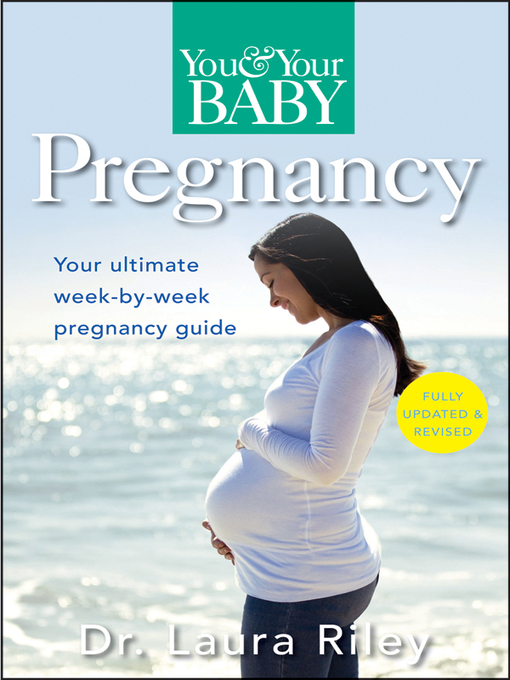 From this point on, the head will grow more slowly and the torso will grow faster.
From this point on, the head will grow more slowly and the torso will grow faster.
What else is going on with your baby's body?
CIRCULATION
By the time of 12-13 weeks of pregnancy, the heart has four chambers, but, unlike the heart of an adult, it has a hole between the right and left atria. It "beats" with a frequency of 155 - 148 beats per minute.
NERVOUS SYSTEM
The fetus moves well, many reflexes are already developed: the baby reacts to touching the skin of the face, palms and heels, to loud sounds and bright light. Thanks to the development of tongue receptors, the child feels the taste of amniotic fluid.
LEATHER
While it is very thin and translucent, with translucent blood vessels. However, by the 12th - 13th week of pregnancy, the rudiments of the sebaceous and sweat glands have already formed in it.
BONE
The bones of the baby are made of cartilage tissue, but gradually begin to harden.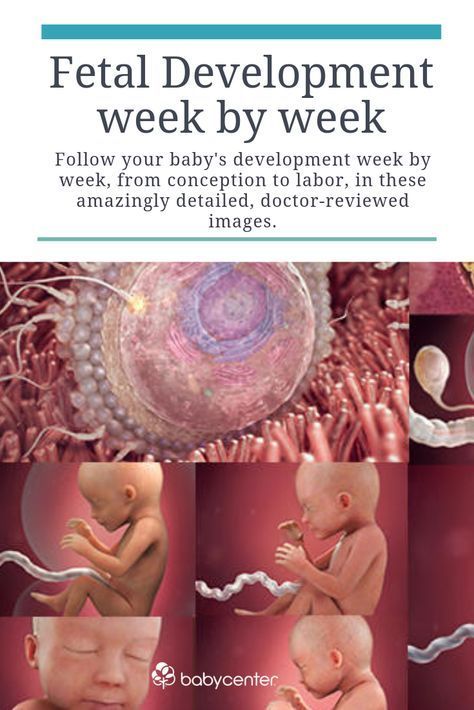 That is why it is very important for the expectant mother to get as much calcium as possible with food.
That is why it is very important for the expectant mother to get as much calcium as possible with food.
IMMUNE SYSTEM
From the 13th week of pregnancy, B-lymphocytes (immunity cells) are formed in the bone marrow of the fetus, and immunoglobulins (antibodies) of all classes are synthesized in the blood. But despite this, the child's immune system is not yet active and cannot protect him from intrauterine infection.
RESPIRATORY SYSTEM
The respiratory muscles of the fetus are already well developed, their contractions occur when the glottis is closed, so the amniotic fluid does not enter the lungs.
DIGESTIVE SYSTEM
By the 13th week of pregnancy, some enzymes are already produced in the baby's body, and the fetal liver is able to form bilirubin.
ENDOCRINE SYSTEM
The pancreas produces insulin, a hormone that maintains normal blood sugar levels. And the thyroid gland synthesizes thyroxine, which is necessary for the growth and development of the body. Therefore, at this stage, the mother should receive a sufficient amount of iodine.
Therefore, at this stage, the mother should receive a sufficient amount of iodine.
KIDNEYS
The urinary system of a child at the 13th week of pregnancy is already functioning: the kidneys produce approximately 2.2 ml of urine per hour.
GENITAL SYSTEM
In girls, follicles are laid in the ovaries; in boys, the process of moving the testicles into the scrotum begins, which will be completed by birth.
YOUR FEELING AT 13 WEEKS OF PREGNANCY
With the beginning of the second trimester (and this is 12 - 13 weeks of pregnancy), most women feel a surge of vivacity and vitality. Mood improves, irritability and tearfulness disappear.
During this period, the expectant mother develops an appetite, and only some pregnant women continue to be bothered by nausea in the morning (it will finally disappear by the 16th week).
During the 13th week of pregnancy, the placenta produces the hormone progesterone, which has a relaxing effect on smooth muscle fibers. This is necessary in order to reduce the tone of the uterus and prevent miscarriage, but the digestive organs also experience the same effect, which causes constipation.
This is necessary in order to reduce the tone of the uterus and prevent miscarriage, but the digestive organs also experience the same effect, which causes constipation.
At the end of the first trimester, at a period of 12-13 weeks of pregnancy, intensive preparation of the breast for lactation began. The number of lobules in the mammary glands increases, which is often accompanied by their engorgement and soreness, and the breasts can become 1-2 sizes larger.
As for the nervous system, from the 13th week of pregnancy, the balance of the processes of excitation and inhibition occurring in the brain is restored. And if earlier the latter prevailed (you felt drowsy, were slow, uncollected), now everything falls into place. In the second trimester, your efficiency will increase and you will easily cope with household and professional duties.
RISK FACTORS
The 13th week of pregnancy is very controversial: on the one hand, everything is getting better, but most often it is during this period that expectant mothers develop candidiasis (thrush).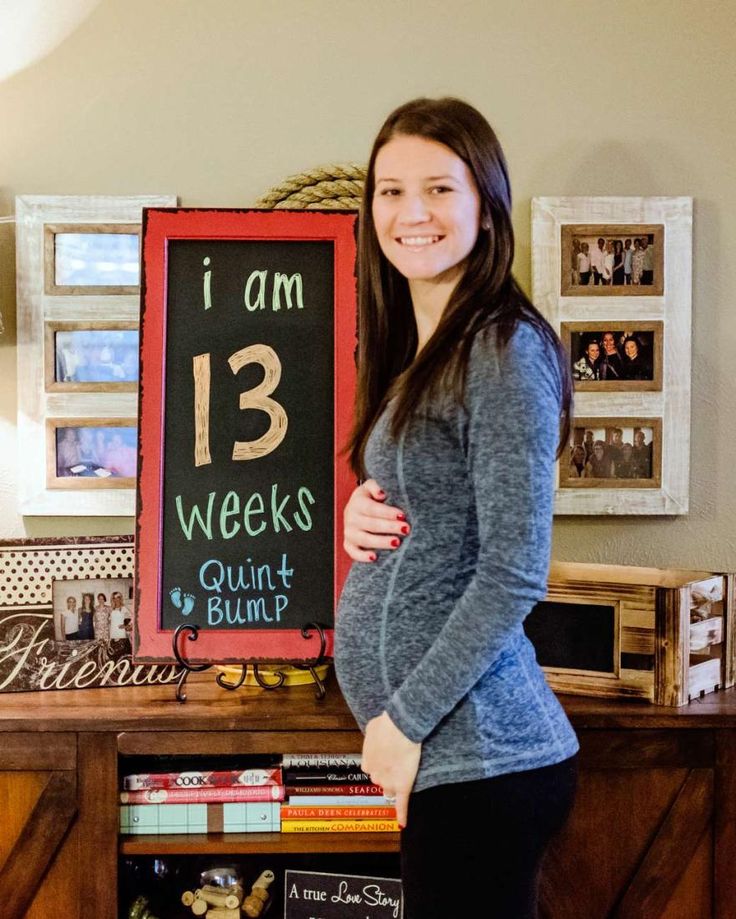 The cause of the development of the disease is candida fungi. They are in the body of every person and in a passive state do not cause any problems, but with stress and immunity failures, they begin to activate and displace the normal microflora.
The cause of the development of the disease is candida fungi. They are in the body of every person and in a passive state do not cause any problems, but with stress and immunity failures, they begin to activate and displace the normal microflora.
Signs of thrush - a feeling of sharp itching in the genitals and curdled white discharge. Do not rush to self-medicate: washing and douching with antiseptics will bring only short-term relief. And the lack of qualified medical care at the 13th week of pregnancy is fraught with an increase in the tone of the uterus. In addition, a bacterial infection can join candidiasis, and in this case there will be a risk of intrauterine infection of the fetus. The consequences of such an infection can be the most unpleasant.
MEDICAL SUPERVISION
If you have already registered with the antenatal clinic, then by the 12th - 13th week of pregnancy, the first prenatal screening should be carried out. If for some reason this is not done, you need to urgently undergo an examination, which includes:
- Fetal ultrasound;
- Free b-hCG assay;
- PAPP-A assay, or protein A.

Screening assesses the risk of neural tube defects and chromosomal abnormalities associated with diseases such as Edwards syndrome and Down syndrome.
Ultrasound at the 13th week of pregnancy will show the shape and size of the baby, his movement. In addition, with the help of ultrasound, the doctor will be able to assess the condition of the uterus, presentation and placenta attachment, and determine the approximate date of birth.
Also at the stage of 13 weeks of pregnancy, it is necessary to do a clinical blood test and a general urine test. According to their results, the risk of developing anemia, inflammatory and endocrine diseases is assessed.
RECOMMENDATIONS
Nutrition advice remains the same for the 12th to 13th week of pregnancy. Your diet should be wholesome, balanced, and include seasonal fruits and vegetables, animal protein, and dairy products. Try not to overeat and control your weight.
If you are concerned about constipation at 13 weeks of pregnancy, add cereal dishes and foods rich in fiber (bran, raw vegetables) to the menu.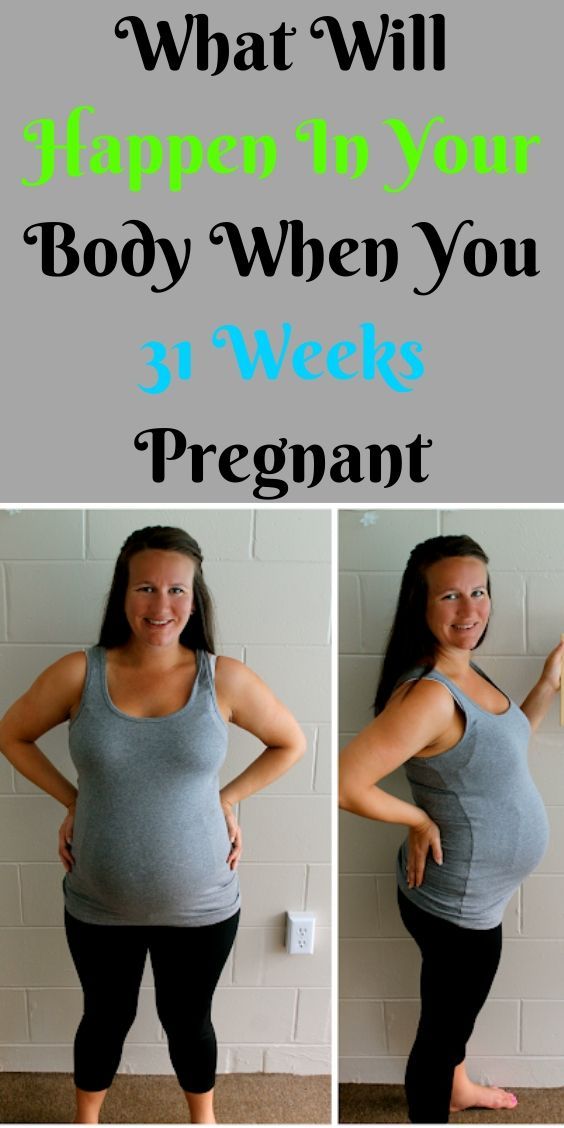 Be sure to drink plenty of fluids: ideally, you should drink at least 8 glasses of water every day.
Be sure to drink plenty of fluids: ideally, you should drink at least 8 glasses of water every day.
Spend more time outdoors, do simple physical exercises, if possible, go to the pool. Throughout the entire period of waiting for the baby (including at the 13th week of pregnancy), try to avoid crowded places with a large number of people. Be careful with the choice of household chemicals. In case of illness, do not self-medicate, but immediately contact a specialist.
If there are no medical contraindications, do not give up intimacy at the 13th week of pregnancy: it has a positive effect on the state of the body and helps to harmonize relations with your "soulmate".
Pregnancy and childbirthThe third month of pregnancy: changes in the female body and fetal development by week
Pregnancy and childbirthTests and examinations during pregnancy
Child nutritionVitamins and minerals during pregnancy and breastfeeding
Putting order in our knowledge about what vitamins and minerals and in what quantity are necessary for the health of the child, and what foods contain them.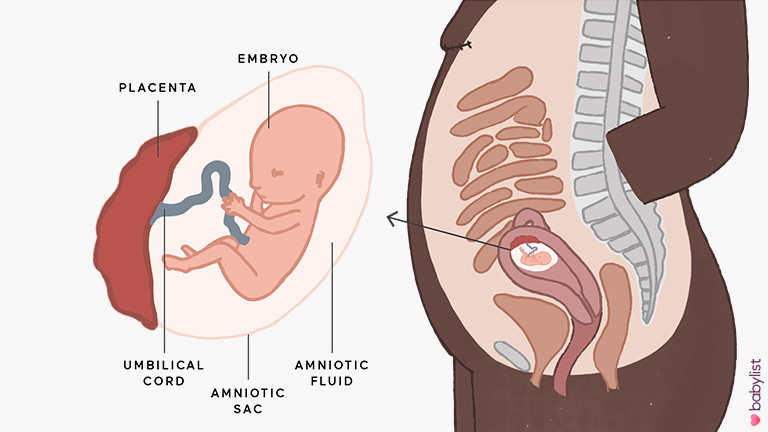
Sports during pregnancy
What is the use of sports during the period of expectation of a baby and which sport to choose?
Pregnancy and childbirthWork during pregnancy
How to work during pregnancy? What benefits and guarantees does the expectant mother have?
Pregnancy and childbirthSex during pregnancy
Is it possible to have sex during pregnancy, what should be taken into account, what positions to choose?
Pregnancy and childbirthEating Right During Pregnancy
How to create a healthy diet for a pregnant woman, what vitamins should be present in the diet, how much liquid should be drunk, what drinks to prefer and what to avoid, what foods are considered harmful for pregnant women and how to keep weight under control while staying in a good mood.
13th week of pregnancy what happens to the fetus
The first trimester, which was troublesome for the mother, has passed, early toxicosis has ended, the psychological background is gradually improving. The 13th week of pregnancy marks the beginning of the second trimester. There is still a lot of time before the birth of a child, which means that a woman can fully enjoy her condition and calmly watch how the baby grows and develops in her. This is the time for new experiences and sensations.
Fetal development at 13 weeks
The beginning of the second trimester is the active growth of the baby. By this period, the length of his body is 7 cm, and the child already weighs 25-28 g. This is already an almost full-fledged tiny man, whose body parts acquire proportionality. His head is not so big, because the active growth of the rest of the body begins.
Interesting! The eyes of the child are located closer to each other, and the facial features acquire individuality. Although at this stage of pregnancy it will not be possible to understand who your child looks like.
Although at this stage of pregnancy it will not be possible to understand who your child looks like.
Changes that occur with the fetus:
- The heart works at a rate of 140 0 170 beats per minute and is able to distill 23 liters of blood.
- A system of 20 milk teeth has been formed, which are still in the gums. Mom needs to be more careful about her diet and introduce more calcium-containing foods into it.
- This is the time for active development of the digestive system. The pancreas begins to produce insulin, and the gallbladder - bile. Villi appear in the intestines to process food.
- The skeletal system is strengthened.
- Vocal cords are forming.
- The first signs of auricular development appear.
- On the 13th week, nature makes its own adjustments to the appearance of the sexual characteristics of the unborn child. During this period, the prostate gland develops in boys, and the ovaries in girls, and there is a laying for the penis or female genitalia.
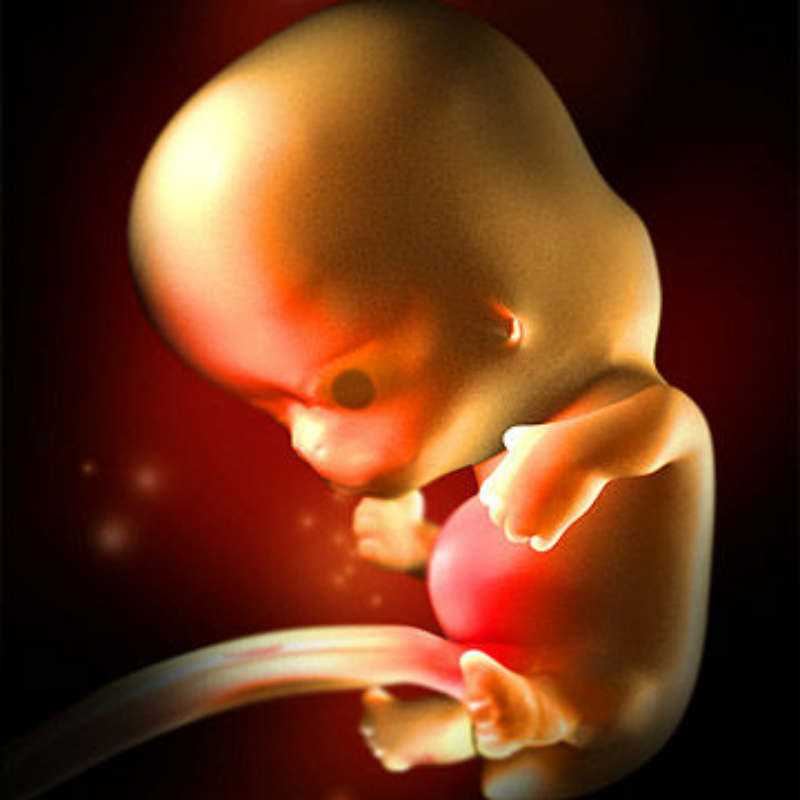
- The child's skin is still thin and has a red tint due to translucent blood vessels.
- Muscles are developing, the neck is no longer so tightly pressed to the head. Mimicry is also supplemented - the child learns to make sucking movements.
At the 13th week of pregnancy, the development of the baby does not bypass the emotional sphere. He can listen to external sounds, moves less erratically, perceives smells and even tastes better. During the time that a woman is carrying a child, he gets used to a certain diet, as he is sensitive to the taste of amniotic fluid. Therefore, it is not recommended for a mother to change her eating habits after childbirth.
The child is not yet moving so actively to let the mother feel it. Some women often confuse the movements of the fetus with the processes occurring in the intestines. But now the baby begins to grimace more strongly.
Important! During this period, the mother can actively communicate with her child - talk, sing songs, tell stories.
Her voice soothes the little man.
Mom's well-being at 13 weeks
The second trimester is the best period of pregnancy. The birth is still far away, the hormones have finally fulfilled their function and calmed down, the toxicosis has receded. The growing uterus is already changing the contours of the waist, but so far the woman herself sees this to a greater extent, unless, of course, she has a multiple pregnancy.
Since the uterus rises into the abdominal cavity, the pressure on the intestines increases, which means that constipation, flatulence, shortness of breath, and heartburn are more common. A woman's weight increases, so a feeling of heaviness and fatigue may appear, especially at the end of the day. The back may ache a little and pull the lower abdomen, but this is due to the growing uterus.
Important! There should be no suspicious vaginal discharge and severe pain. If such symptoms bother a woman, she should immediately consult a doctor.





